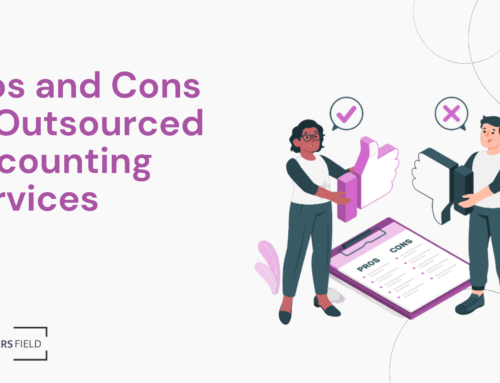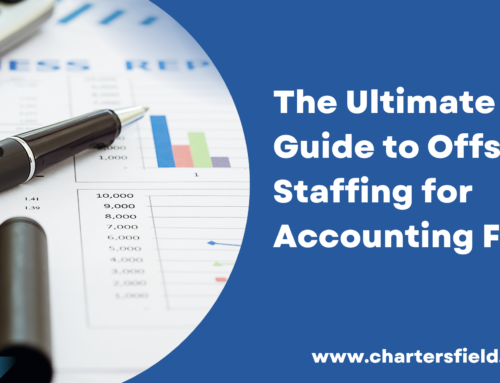Introduction
Outsourced accounting services involve assigning specific financial tasks to outside professionals or agencies. These tasks may include bookkeeping, payroll processing, tax preparation, financial analysis and more. By outsourcing these functions, businesses can take advantage of specialized expertise, streamline their financial processes, and focus on their core competencies.
Financial management is no longer limited to a crunch of numbers. It has become the pivot of business strategy. In an era where data-driven decisions shape success, businesses recognize that effective financial management is crucial for sustainable growth. Whether it’s optimizing cash flow, managing budgets, or making informed investment decisions, financial management forms the backbone of strategic business planning.
Evolving Landscape of Accounting
As we move into the 21st century, the accounting landscape is undergoing profound change. Gone are the days when accounting was limited to bookkeeping and manual calculations. The contemporary business environment, characterized by technological advancements, globalization, and increasing competition, has propelled accounting into a new era.
Discuss the changing role of accounting in modern businesses.
Traditionally viewed as a back-office function focused primarily on record-keeping and compliance, accounting has evolved into a strategic business tool. In modern businesses, accounting is no longer just about balancing the ledger; it plays an important role in shaping organizational strategies. Businesses now recognize the strategic importance of financial insights in decision-making processes.
Must Read: 10 Benefits of Using Microsoft Dynamics 365 Finance and Operations
Define outsourced accounting and its main components:
Outsourced accounting is a business arrangement where certain financial functions, traditionally handled in-house, are outsourced to outside professionals or agencies. These tasks can include a variety of activities, such as bookkeeping, payroll processing, tax preparation, financial analysis, and more. By delegating these tasks to specialized providers, businesses can streamline their financial operations and access a level of expertise that may not be available in-house.
Strategic Benefits of Outsourced Accounting
Outsourced accounting offers businesses a set of strategic benefits that extend beyond the mere delegation of financial functions. These advantages contribute to cost-effectiveness, increased expertise, and an increased ability to focus on core business functions.
Cost Efficiency:
Outsourcing accounting functions can significantly reduce operating costs for businesses. When compared to maintaining an in-house accounting department, which includes expenses such as salaries, benefits, training, and infrastructure, outsourcing presents a cost-effective option. External accounting companies often work with flexible fee structures, allowing businesses to pay for the specific services they need without the overhead costs associated with full-time employees. Cost efficiency is a key driver for businesses that want to maximize their financial resources and allocate budgets strategically.
Access to Expertise:
Outsourced accounting gives businesses access to a pool of specialized skills and knowledge that may not be available in-house. External accounting professionals are usually well-versed in the latest accounting principles, technologies, and regulatory changes. Their expertise extends beyond routine bookkeeping to include complex financial functions such as tax planning, financial analysis, and compliance management. By leveraging this specialized knowledge, businesses can ensure accuracy, compliance, and strategic financial decision-making.
Focus on core competencies:
Outsourcing accounting functions allows businesses to redirect their focus and resources toward their core competencies. Instead of devoting time and energy to managing internal accounting processes, businesses can focus on strategic initiatives, innovations, and activities that directly contribute to their growth. By freeing up internal resources from routine financial tasks, outsourcing enables businesses to become more agile and responsive in their primary functions. This strategic advantage puts businesses in a position to thrive in competitive markets, as they can devote more time and effort to activities that differentiate them from competitors.
Must Read: ERP Implementation: The 9-Step Guide to Streamlining Your Business Operations
Enhanced accuracy and compliance
Accuracy and compliance are paramount in the field of financial management. This section explores the importance of accuracy in financial reporting and how outsourced accounting services play a vital role in ensuring accuracy and compliance with regulations.
Discuss the importance of accuracy in financial reporting and compliance.
Accuracy in financial reporting is the foundation on which informed business decisions are made. Whether for internal analysis, stakeholder communications, or regulatory compliance, accurate financial data is indispensable. It builds confidence among stakeholders, including investors, creditors, and internal management, and promotes confidence in the reliability of the financial information presented.
Learn how outsourced accounting services can improve accuracy and ensure compliance with regulations.
Outsourced accounting services provide a high level of expertise and attention to detail that can significantly increase accuracy in financial reporting. External professionals are well-versed in accounting best practices, up-to-date with regulatory changes, and equipped with the knowledge to meet complex compliance requirements.
Provide examples of how accurate financial data contributes to strategic decision-making:
Accurate financial data is not just a regulatory requirement; it serves as the cornerstone for strategic decision-making. Businesses rely on accurate financial information to assess their financial health, identify trends, and make informed decisions about resource allocation, investment, and growth strategies.
For example, accurate financial data allows businesses to assess the profitability of different product lines, identify cost-saving opportunities, and strategically allocate budgets. Inaccurate financial information can lead to wrong decisions, potentially affecting the overall financial health and stability of the business.
Scalability and Flexibility
Outsourced accounting services provide businesses with a dynamic solution that suits their growth path and changing financial needs.
Scaling with Business Growth:
Outsourced accounting services offer a scalable model that adjusts seamlessly to the growth of a business. Whether it is managing increased transaction volumes, expanding operations, or entering new markets, outsourcing ensures that accounting processes can grow efficiently without putting a strain on internal resources.
Flexibility to adapt to changing financial needs:
The flexibility inherent in outsourcing allows businesses to adapt rapidly to changing financial needs. This adaptability is important in responding to market fluctuations, economic changes, or evolving business strategies. Outsourced services can be tailored to meet specific requirements, ensuring that businesses remain agile in a dynamic business environment.
Must Read: Offshore Tax Preparation: Step-by-Step Process to Hire an Offshore Tax Preparer from ChartersField
Demonstrating Benefits Through Case Studies:
Real-world examples and case studies demonstrate how businesses have benefited from the scalability and flexibility of outsourced accounting solutions. These examples may include examples where companies seamlessly expanded their operations without the need for significant internal restructuring or how they easily navigated periods of financial change due to the adaptable nature of outsourcing.
technology integration
Outsourced accounting services utilize cutting-edge technologies, increasing efficiency and providing real-time financial insights.
Leveraging Advanced Technologies:
Outsourced accounting adopts cutting-edge technologies to streamline financial processes and increase accuracy. This includes the use of advanced software, analytics tools, and other innovations that are at the forefront of the accounting industry.
Integration of cloud-based tools and automation:
Cloud-based accounting tools and automation play a vital role in the outsourced accounting landscape. These technologies enable seamless collaboration, secure data storage, and automating routine tasks, reducing manual efforts and the risk of errors.
Role of technology in real-time financial insights:
Technology is a key enabler for providing real-time financial insights. Through integrated systems and automated reporting, businesses that leverage outsourced accounting services gain access to up-to-the-minute financial data. This timely information empowers decision-makers to respond quickly to changes in the market and make informed strategic choices.
Reducing risks and improving safety
Outsourced accounting services play a vital role in reducing risk and increasing security compared to in-house accounting practices.
Addressing Risks in In-House Accounting:
In-house accounting is vulnerable to risks such as fraud and data breaches due to limited oversight. Internal employees may have access to sensitive financial information, posing potential threats.
Strong Security Measures in Outsourced Accounting:
Outsourced accounting services implement stringent security measures to protect client data. This includes encryption protocols, access controls, and compliance with industry standards to protect against unauthorized access, fraud, and data breaches.
Risk Mitigation Strategies through Outsourcing:
Outsourcing serves as a risk mitigation strategy by reducing internal vulnerabilities. External firms often have stringent security protocols, including regular audits and employee training, which increases overall resilience against potential risks associated with financial data.
conclusion
In conclusion, the strategic benefits of outsourced accounting far outweigh traditional financial practices. The pursuit of cost efficiency, access to specialized expertise, scalability, flexibility, increased accuracy, and strong security underpin the transformative power of outsourcing. As businesses navigate the complex landscape of financial management, adopting the strategic benefits provided by outsourced accounting emerges as a critical decision. It is not simply a delegation of tasks but a path to mastering the numbers, allowing businesses to focus on core competencies, achieve financial accuracy, and set themselves up for continued growth. The call-to-action is clear: consider the strategic implications of outsourced accounting and unlock a new realm of possibilities for financial success.



